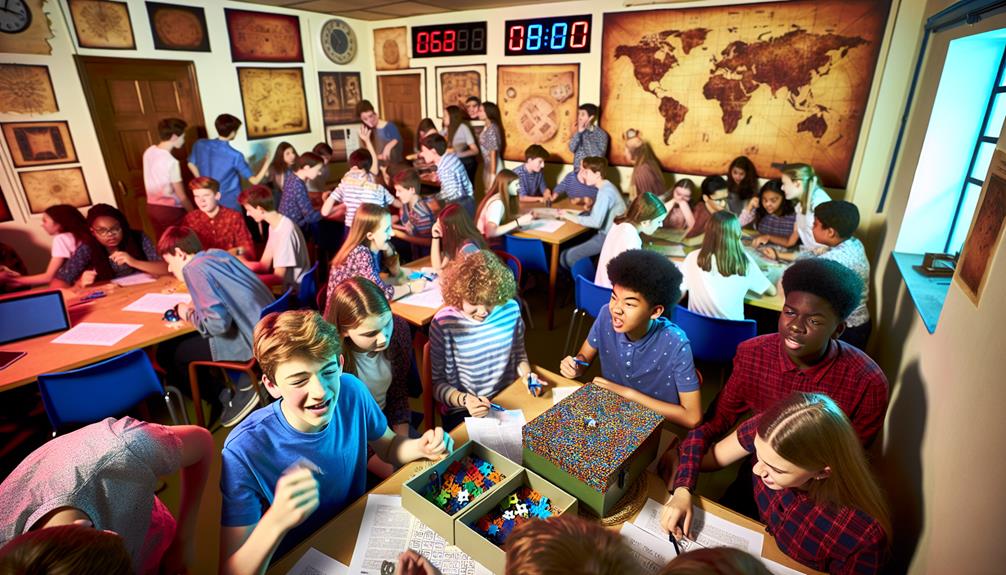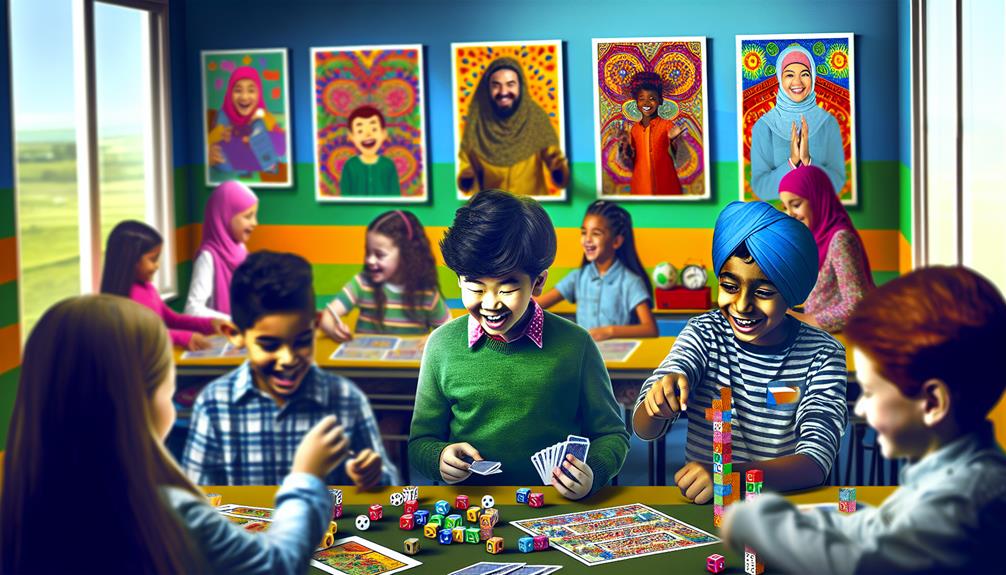Classroom games are excellent tools for enhancing student engagement and learning. One option is the Jeopardy Style Quiz, promoting collaboration and reinforcing key concepts. The Scavenger Hunt Challenge encourages teamwork and critical thinking while keeping students active. Pictionary With a Twist stimulates creativity and vocabulary skills in a fun format. Team Trivia Battles foster communication and camaraderie among students. Finally, the Escape Room Experience immerses learners in problem-solving tasks that integrate various subjects. Each activity not only promotes essential skills but also creates a supportive environment conducive to learning. Explore the details of these innovative games further.
Key Takeaways
- Jeopardy Style Quiz promotes collaboration and reinforces learning through a competitive question-and-answer format across various subjects.
- Scavenger Hunt Challenge fosters teamwork and critical thinking while engaging students in a fun, active learning environment.
- Pictionary With a Twist enhances vocabulary and communication skills through creative drawing related to educational content, making learning enjoyable.
- Team Trivia Battles encourage students to work together to answer diverse questions, promoting critical thinking and a sense of community.
- Escape Room Experience immerses students in problem-solving activities that integrate curriculum subjects, enhancing collaboration and real-world skills.
Game One: Jeopardy Style Quiz

The excitement of competition can invigorate a classroom, making learning both enjoyable and effective. One of the most engaging ways to harness this energy is through a Jeopardy Style Quiz. This game format effectively combines fun with educational content, encouraging students to actively participate while reinforcing their knowledge across various subjects. Additionally, incorporating elements of teamwork and communication is essential, much like navigating remote work challenges, which often require collaboration and problem-solving skills.
In a Jeopardy-style quiz, students are divided into teams and presented with a board of categories and point values. Each team selects a question, and upon answering correctly, they earn points. This format not only fosters student engagement but also promotes collaborative learning, as students must work together to discuss and determine the best answers.
Moreover, this game serves as an excellent tool for learning reinforcement. By revisiting key concepts in a competitive setting, students solidify their understanding and retention of the material. The immediate feedback from correct or incorrect answers further enhances their learning experience, providing clarity on areas that may need additional focus.
Implementing a Jeopardy Style Quiz can transform the classroom atmosphere, creating a sense of belonging and camaraderie among students while driving academic success.
Game Two: Scavenger Hunt Challenge
Engaging students in a dynamic learning environment can take many forms, one of which is the Scavenger Hunt Challenge. This interactive activity not only fosters a sense of community but also encourages students to work together in teams. By searching for specific items or clues, students must utilize critical thinking skills to decipher hints and make strategic decisions, enhancing their problem-solving abilities. Incorporating resources such as maximize your learning can further enrich the experience and provide additional support for students.
To implement a Scavenger Hunt Challenge, educators can create a list of objectives tailored to the curriculum, incorporating various subjects such as science, history, or mathematics. Teams can be formed to promote collaboration, allowing students to share ideas and support one another throughout the process. This collective effort fosters an inclusive atmosphere and strengthens peer relationships.
Additionally, the physical aspect of a scavenger hunt can energize students, making learning more enjoyable and memorable. As they race against the clock, students are motivated to engage actively with the material, thereby solidifying their understanding.
Ultimately, the Scavenger Hunt Challenge not only reinforces educational concepts but also cultivates essential life skills, including teamwork and critical thinking, preparing students for future collaborative endeavors.
Game Three: Pictionary With a Twist

Releasing creativity and communication skills, Pictionary With a Twist offers an innovative approach to the classic drawing game, transforming it into an educational tool that enhances teamwork and critical thinking. Recently, there have been discussions around various companies, including Shein, facing potential challenges in the coming year, which may impact the industry and its players, as seen in reports about Shein potentially closing in 2024. This engaging game not only fosters artistic expression but also promotes vocabulary enhancement among students.
In this version, players draw words or phrases related to specific subjects, such as science, literature, or geography. Each round, a new theme is introduced, encouraging students to explore diverse vocabulary while collaborating with peers. As players take turns drawing and guessing, they develop their ability to articulate ideas clearly and think critically about the clues provided.
To further enrich the experience, consider incorporating a time limit or using a digital drawing platform, which can heighten excitement and engagement. As students participate, they will not only reinforce their understanding of key concepts but also build strong relationships with their classmates. Pictionary With a Twist serves as an excellent bridge between learning and fun, creating a supportive environment that fosters belonging. Ultimately, this game empowers students to enhance their vocabulary while embracing their creativity, making it a valuable addition to any classroom.
Game Four: Team Trivia Battles
Building on the collaborative spirit fostered by Pictionary With a Twist, Team Trivia Battles presents an exciting opportunity for students to enhance their knowledge while working together. This game not only promotes learning but also strengthens team dynamics, as students must rely on each other's strengths to devise effective trivia strategies.
| Category | Sample Questions |
|---|---|
| Science | What is the chemical symbol for gold? |
| History | Who was the first President of the United States? |
| Geography | What river is the longest in the world? |
| Literature | Who wrote "Romeo and Juliet"? |
| Mathematics | What is the value of Pi to two decimal places? |
In Team Trivia Battles, students are divided into teams, competing to answer questions from various categories. This format encourages communication, collaboration, and critical thinking, essential skills in both academic and social settings. By fostering an inclusive atmosphere, students feel a genuine sense of belonging, which enhances their overall learning experience. Ultimately, Team Trivia Battles serves as a dynamic platform for students to bond while expanding their knowledge base.
Game Five: Escape Room Experience

As students step into the immersive world of an Escape Room Experience, they are immediately challenged to think critically and collaboratively to solve complex puzzles within a set timeframe. This hands-on activity fosters an engaging environment where learners work together, honing their collaborative problem-solving skills as they decipher clues and reveal mysteries. This approach mirrors the innovative strategies seen in industries like electric vehicles, where companies like Tesla are driving global EV sales through collaborative technological advancements.
In this dynamic setting, students must utilize their critical thinking skills to navigate through various scenarios. Each puzzle requires a unique approach, encouraging participants to brainstorm and strategize collectively. As they collaborate, students not only enhance their cognitive abilities but also develop essential social skills, such as communication and teamwork.
Educators can design Escape Room experiences tailored to specific learning objectives, integrating subjects like math, science, or language arts into the challenges. This innovative format promotes a sense of belonging among students, as they rely on one another's strengths to overcome obstacles and achieve a common goal.
Ultimately, the Escape Room Experience serves as a powerful tool for fostering a supportive classroom atmosphere, while equipping students with valuable skills that extend beyond the classroom and into real-world scenarios.
Frequently Asked Questions
How Can I Adapt These Games for Different Age Groups?
To effectively adapt games for different age groups, consider implementing age-appropriate modifications and skill level adjustments. Tailor the complexity of tasks or questions based on the developmental stage of participants, ensuring engagement and understanding. For younger children, simplify rules and incorporate visual aids, while older students can handle more intricate strategies and competitive elements. By recognizing the diverse abilities within a group, you foster an inclusive environment that promotes learning and collaboration among all participants.
What Materials Are Needed for Each Classroom Game?
To effectively implement classroom games, it is essential to identify the necessary game materials and classroom supplies. Common items include cards, dice, markers, paper, and timers, which facilitate various activities. Additionally, technology such as tablets or interactive whiteboards can enhance engagement. Organizing these materials in advance guarantees a smooth execution of the games, fostering an inclusive environment where all students feel a sense of belonging and can actively participate in the learning experience.
Are These Games Suitable for Remote Learning Environments?
The suitability of games for remote learning environments hinges on effective engagement strategies and virtual collaboration. Many educational games can be adapted to foster an interactive online atmosphere, promoting teamwork and communication among students. By leveraging technology, instructors can create an inclusive space that encourages participation, ensuring that all learners feel connected and valued. Ultimately, these games can serve as powerful tools to enhance learning experiences in a virtual setting, fostering a sense of belonging.
How Long Should Each Game Typically Last?
The ideal game duration typically ranges from 15 to 30 minutes, balancing engagement and learning objectives. This timeframe is conducive to maintaining student focus and maximizing participation. Shorter games can lead to heightened student engagement by fostering a dynamic atmosphere, while slightly longer sessions allow for deeper exploration of concepts. Ultimately, adjusting game duration based on the specific context and student needs is essential for optimizing educational outcomes and enhancing the overall learning experience.
Can These Games Be Played Without Technology?
Yes, these games can indeed be played without technology. Engaging in technology-free activities fosters collaborative learning and encourages interpersonal skill development among participants. By facilitating direct interaction, students can enhance their communication and teamwork abilities, creating a sense of belonging within the group. Such experiences not only promote essential life skills but also allow for creativity and adaptability, ensuring that learning remains both enjoyable and effective in a traditional classroom environment.




